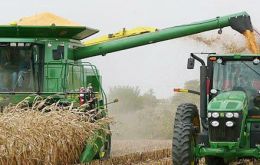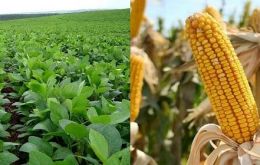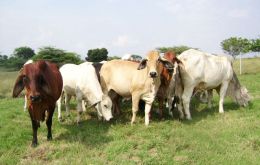MercoPress. South Atlantic News Agency
Agriculture
-
Wednesday, March 5th 2014 - 04:52 UTC
China buys majority stake in Nidera as part of its investment in food assets

China's State-owned Chinese food giant Cofco Corp. on Friday announced it was buying a 51% stake in closely held grains trader Nidera NV. By investing in Dutch Nidera, Cofco--China's largest stated-owned grain trader-- would have greater control over pricing as well as better access to major grain-growing regions, such as Latin America and Russia.
-
Friday, February 28th 2014 - 03:28 UTC
Brazil GDP expanded 2.3% in 2013; agriculture again the main engine

Brazil's economic output grew 2.3% in 2013 for a third straight year of modest expansion by Latin America's biggest economy, the government announced on Thursday. GDP for the final quarter of the year rose a 0.7% compared to the third quarter, according to Brazil's Institute for Geography and Statistics, IBGE.
-
Wednesday, February 26th 2014 - 20:33 UTC
Brazil farmers want a Mercosur/EU trade agreement even leaving Argentina out

Brazil would like free-trade talks between the European Union and Mercosur to include Argentina, but would be prepared to proceed without its regional ally if an understanding can't be reached on March 7, according to the head of Brazil's farming confederation.
-
Saturday, February 15th 2014 - 05:46 UTC
Despite adverse climate Brazil expects record harvest: 193.6 million tons

Weeks of drought and heat have hit Brazil's soy and corn production, but the agriculture ministry still predicted a record 2014 harvest. Corn production is set to total 75.5 million metric tons, down from a January estimate of 79 million, state food supply agency Conab said in its monthly report.
-
Friday, February 7th 2014 - 21:00 UTC
Falklands' farmers urged to prepare for declining wool prices forced by currencies' distortions

Falkland Islands farmers are being urged to plan for income reductions in the order of 15 to 25% for the season's wool production with the potential for more reductions, MLA Phyl Rendell announced in Legislative Assembly last week.
-
Wednesday, February 5th 2014 - 08:38 UTC
US Senate passes 1 trillion dollars farm bill with crop insurance program, cuts in subsidies and food stamps

The United States Senate on Tuesday passed the long-awaited almost 1 trillion dollars farm bill, ending two years of partisan clashes and stalled negotiations. The bill was approved with strong bipartisan support, 68 to 32.
-
Saturday, January 18th 2014 - 05:55 UTC
Dairy values and meat peaked in 2013 according to FAO Food Price Index

The FAO Food Price Index averaged 206.7 points in December 2013, nearly unchanged from November, as a sharp increase in dairy prices and firming meat values largely balanced out a steep decline in sugar quotations and lower cereal and oil prices.
-
Saturday, January 18th 2014 - 05:50 UTC
Global cereal production in 2013 and outlook revised upward, says FAO

FAO’s latest forecast for world cereal production in 2013 has been revised upward marginally (2 million tons) since November to a new high of almost 2 500 million tons (including rice in milled terms), 8.4% more than last year and some 6% above the previous record in 2011.
-
Saturday, January 18th 2014 - 05:08 UTC
Falklands' pastures development scientist in the New Year's Honors List

Two scientists from Britain's Agri-Food and Biosciences Institute (AFBI) have been awarded OBEs in the New Year’s Honors list. Professor Jim McAdam from Queen's University Belfast, for services to research and agriculture in the Falkland Islands, and Dr Danny Todd was honored for his contribution to biological sciences and veterinary work, reports Farming Life.
-
Monday, January 13th 2014 - 07:09 UTC
Paraguay plans to climb from eighth to world's fifth exporter of beef by 2018

One of Paraguay's priorities is to make the country the world's fifth exporter of beef by 2018, according to Industry and Trade minister Gustavo Leite. The land locked member of Mercosur currently holds the eighth position.